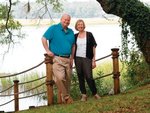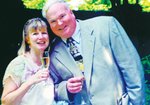



Cassandra King Conroy met, and then married, celebrated novelist Pat Conroy after each were successful, published authors. Their marriage and 18-year relationship ended when Pat Conroy — author of “The Lords of Discipline,” “The Prince of Tides” and “The Great Santini,” among many others — died of pancreatic cancer in 2016.
In 2018, Cassandra published “Tell Me a Story,” a memoir about their life together. The book became a best-seller and won the Southern Book Prize for nonfiction in 2020. Each of her previous books, all novels, have received wide acclaim and numerous book of the year nominations.
On Oct. 9, she’ll be the keynote speaker for Chatham Literacy’s “Fall for Literacy” luncheon. The fundraiser will provide funds for the nonprofit to help adults living or working in Chatham County acquire the literacy and educational skills they need to function successfully in society. The luncheon is scheduled for 11 a.m. to 2 p.m. at the Chatham County Agriculture & Conference Center in Pittsboro. To register, or for more information, go to chathamliteracy.org.
News + Record Publisher and Editor Bill Horner III spoke to Cassandra about her work and her upcoming visit to Chatham County. The interview has been edited for clarity and length.
Well, I wish I had that. If I did, I could bottle it and sell it and make a big donation to Chatham Literacy.
I always wanted to be a writer and I loved storytelling, loved reading. But I came along in a generation where women could be teachers or secretaries or nurses. And so my mother said, “Yeah, you know, that’s a nice little hobby, writing, but you need to get a teaching certificate.”
You know, I loved teaching … but I have written stories, and tried to write books, since I was able to pick up a pen.
But I never took myself seriously, or considered myself a writer, until really and truly later in college. I had a professor who encouraged me and I had some stories published in academic journals. And when my kids got older, I went back to school to get a master’s in English and that’s when I really started out. So what I’m saying is this: I came late, really late to the game.
I was 50 when my book was my first book was published. And so I had a little bit different start that than a lot of writers, but that kind of qualifies me to say, “You know, folks, if I can do it, you can too.” Don’t think that it’s too late.
What I would hope he would say, of course — because Pat had this very flowery language at times, and could be over the top — but what I would want him to say it that it’s the best book since Tolstoy! But knowing Pat, he would be much more likely to say, “Do not believe a word about me in this book!” And that would be his blurb.
I think I sort of said it about the made-up blurb from him, and that’s his sense of humor. That’s one thing I loved. And I’ve heard so many people tell me about Pat’s books — you could be laughing, with tears rolling down … laughing on one page, and then crying real tears at the tragic, tragic turn of events on another page.
But he was every bit as funny in person.
In the classes I had taught before I met Pat, I would give handouts on examples of different writers’ use of imagery and so forth. And of course, I could have done those strictly on Pat Conroy’s books, because of his beautiful, poetic language. That’s what he’s known for as much as anything else.
But I have to admit, I also just personally love the storytelling. Pat was a great storyteller. And a lot of books I’ve read are full of beautiful imagery, and can transport you to a place like that. And sometimes you just read them for that reason. But with Pat, you’d have a page-turner of a story as well. And that’s what I loved about his writing.
I’m not so sure that in my craft that I changed that much, but he certainly did one important thing for me as a writer. And that was Pat, more than anyone, taught me to respect myself as a writer and to respect my time.
I think that that’s a something that male and female writers run into, but probably more female writers would say this — that you feel guilty sometimes if you’re taking a lot of time away from your family to off somewhere to write. Pat told me right at first: “Your family is not going to look at you as having a job, like when you were teaching. You couldn’t do such and such for them because you had classes.”
You’ve got to look at your writing in the same way, he said. And that’s a very practical kind of thing that I don’t know I would have gotten from anywhere else. And it really, really was important. It gave me a whole new perspective about writing.
Well, I’m not even going to pretend that I had much of an influence at all on him, though I did a lot of editing because he teased at first when we got married, saying, “Oh goody, I’ve got an in-house editor! Now my editor in New York is going to be so happy.”
Because Pat always had so much more material that ended up in his books, which is a shame because he wrote so beautifully … So I would go over and he would say, “Now treat it just like you were grading an essay.”
And Pat was very honest with himself. He would say things like, “I know, I repeat myself a lot. You know, so help me out with this.”
He did take a page out of my book, so to speak, about not being so easily distracted. When we first got together, he just couldn’t believe that I could go out grocery shopping and come home and put the groceries down, and then start right back to work on my book. He felt like he had to be totally isolated; he didn’t want to have any distractions going on. So he worked at getting better at that, and I think he became more productive as a result.
You know, I mentioned his sense of humor. And I definitely miss that, because Pat also had a dark sense of humor, as I have. And I talk about it in the book, and it can be kind of embarrassing at times because it’s a kind of cringe-worthy humor. But you know, that can pull you out of a bad place at times, and we’ve all done that — where we’re just all down in the dumps together and then somebody will say something funny, and it’ll change the mood. So I certainly miss that about Pat.
But I also miss the companionship. And no one could talk about books like Pat, and I loved that. He would tell me about a book he was reading and a lot of times it wasn’t anything I would ever think I’d want to read. He had a wide, wide range of interest and he read a lot of books that wouldn’t necessarily appeal to me. But I really miss hearing him talk about what he was reading.
I don’t think there’s anything that I don’t like about it. I was I was raised on a family farm and we had no neighbors in sight, and lived way down a dirt road in southern Alabama. Reading took me to another place, to places I could never have gone ... But it did more than that. It took me inside other people, people that I never would have been exposed to as a child on this isolated farm.
And that’s the main thing that I love about reading. And I love that in my writing because as a writer, then, I get to explore and I get to go inside a person — say, you know, a character’s head — and explore more about why they’re what motivated why while they act as they do. And you get empathy from reading.
Anytime you tell a child, “Sit here, and I’m going to tell you a story,” you just watch their faces light up. I don’t care who they are, they will put down their cell phones and their iPads. There is, I think, a universal appeal. That child’s reaction is not something we lose; it’s still there. We love hearing stories. Stories help us understand folks better and help us understand how to solve problems.
I hope to tell more stories — that’s sort of the theme of my discussion. We’ll talk about storytelling and some of the stories I tell in my book about my life with Pat.
I would love to have people sort of expand the idea of literacy, because I think so many times we think, “Oh, you teach people who can’t read how to read.” And that’s wonderful, but literacy is so much more than that. It’s maybe the most important part of anyone’s education — it helps our understanding of the world and the broadening of our perspectives. So it’s just so important and I hope people will consider supporting literacy in the same way they might support their church or the environment or any other different charities, because literacy is every bit as important.